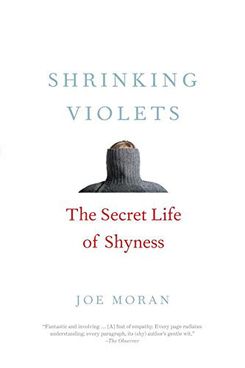
This is how it feels to be shy: It’s like arriving late to a party, where everyone else is already several beers in and “having fluent exchanges on some agreed theme as if by magic.” You’ll never catch up. This, at least, is how author Joe Moran feels about his own shyness, as he writes in his new book, Shrinking Violets: The Secret Life of Shyness.
To Moran, shyness eludes simple definition. It isn’t timidity, or fear; at least, it isn’t only those things. It’s a feeling that can come and go, but it’s also a somewhat stable personality trait. It can be isolating, and feeling tongue-tied is always frustrating, but Moran believes his own shyness has also afforded him a unique perspective on the world. He and his fellow shrinking violets are usually good listeners; they also are often sharp observers of human behavior. Instead of thinking of shyness as something to fight, Moran writes that he’s come to a kind of “Zen acceptance” of the tendency in himself.
Moran, who is a lecturer in English and cultural history at Liverpool John Moores University, recently spoke to Science of Us about his theories on leading a quiet life.
On the very first page of your book, you introduce this really interesting description of shyness: “It feels like coming late to a party when everyone else is about three beers in.” I think typically, you’d expect to see shyness defined as anxiety, or timidity. So why did this party metaphor seem apt to you?
It’s never really seemed to me that shyness was all about fear or timidity. People who aren’t shy, that would be the first thing they would think that it was — that it was about being fearful.
And it’s partly about that. But actually for me — and for, I think, quite a lot of shy people — it’s more about the feeling that you haven’t grasped something about social life that should be obvious, that other people have got. But when you spend some time thinking about it, and talking to others about it — as I have for this book — you start to realize that almost everybody feels like that. It’s part of the nature of social life, that it’s full of unwritten, unspoken social codes. Everybody feels like they’re kind of excluded from it, at least some of the time.

So I started with that because I wanted people to think that shyness was something more complicated than just being fearful. It’s actually about reading social situations — and over-reading them as well.
But, as you write, you can’t know exactly what’s going on in someone else’s mind. So, in a way, shy people are right here — there are no rules, really, at least not ones that work all of the time for every situation. Given that, do you think shy people often understand more about social interactions than non-shy people?
I do think that. Shyness makes you more aware of the compromises of human communication — being tongue-tied, for example, or being slightly inept at social interaction makes you realize that, actually, all language and all social interaction is imperfect in some way. Language itself is almost an accident of evolution, that’s developed to slightly try and bridge the divide between consciousnesses that are actually totally separate.
I think, perhaps, as a shy person, I have become aware of that. I do tend to get tongue-tied, but, really, we’re all tongue-tied, in a way — because even people who are incredibly loquacious and articulate, they’re still really only articulating a tiny little part of their consciousness. Just because you talk and somebody listens and then says something, it doesn’t necessarily mean you understand each other.
Do you see shyness as a gift, or a burden? You seem reluctant to come down on either side in the book.
I think it’s both. And neither. Also, if you are shy, it’s just such a tenacious and resilient part of you, that it almost doesn’t really matter whether it’s a gift or a burden. It’ll always be with you.
What I didn’t want to do in the book was to romanticize shyness, or be a cheerleader for shyness. I think one of the dangers of shyness is that you can wallow in it. And I do think you can make the mistake — or, at least, I’ve made this mistake — of thinking of your shyness as a mark of sensitivity. But I do think that it makes us social in different ways. I suppose I’ve become a writer because of it.
You argue that shy people might get tongue-tied at a party or happy hour, but they also often have no problem speaking in public. Why is that?
I don’t think shy people stop wanting to be social and communicative — it’s just that they often take very circuitous ways of doing that. It goes back to what I was saying before — many shy people are looking for structured ways to communicate, and public speaking gives you a structure. There are clear expectations: If you’re onstage and you’ve got a microphone, and people are there to hear you speak, then you speak. It’s almost like you’ve gotten permission to do it.
One of the things I find hard as a shy person is social ambiguity, and spontaneity. I’m in a group of people, and I don’t know how or when I’m supposed to speak up — and, obviously, the longer you leave it, the harder it is to join in. A whole self-defeating monologue starts going on in your head.
But when you go onstage, that monologue is stilled. You’re in a situation that can be scary, true, but it’s also clear. You know what you’re supposed to do. You’re playing a role. I’m a lecturer at a university, and when I’m teaching, it’s like I’m playing a part — I’m playing an amplified version of me.
I relate so much to that. I sometimes wonder if this is at least part of the reason I became a journalist — it gives me a role to play, a reason to call up a stranger and ask them nosy questions.
Right, absolutely. I think, actually, there are probably quite a lot of shy journalists, and quite a lot of shy interviewers. Because — well, partly because they’re good listeners. But also because, as you say, it gives you a reason to talk to people.
I’ve always thought of shyness as something you grow out of, and if you don’t grow out of it naturally, then it’s something to fight your whole life.
Right, it’s sort of the ideology of our day, changing yourself — personal growth and self-help and all that. So that’s where you get this idea that shyness is something you can, and should, recover from. I think you can certainly find ways of dealing with it, and finessing it, so it’s not so much of a burden to you. And I also think there are probably key moments in your life when you can push back against it, like when you leave home for the first time to go to university. Anytime you get a new set of people around you, that can be a moment when you can say, Yeah, okay, I’m going to be a slightly different person now.
Then again, that certainly has not been true of me. I do think that there’s something quite resilient about shyness as a personality trait. The people I’ve written about in the book — Oliver Sacks, Agatha Christie, Charles Darwin — they’ve tended to be as shy at the end of their lives as they were at the start. They just find ways to work around it. So I do tend to think that if you are shy, you probably will stay like that.
So you don’t believe shyness itself is necessarily a benefit. But is there a case for accepting shyness, in yourself and in others?
I do think that it’s helped me to think of it as a somewhat stable part of my personality, instead of thinking of it as something you can recover from. Instead, I just say, Well, that’s what I’m like. And then, actually, it gets better a bit, anyway, because you obsess about it less. Because shyness is something that is quite circular and self-fulfilling. You can’t just tell a shy person to stop being shy — that’s a bit like when people say, Don’t think of an elephant. It just makes it worse.
The best thing a shy person can do is to not obsess over their own shyness, and to not define themselves by it. I know that sounds a bit odd coming from me, as I’ve just written a book on shyness. But it’s helped me to think, Well, I’m just shy. I don’t feel bad about it, and I don’t feel defeated about it. And, paradoxically, you become less shy, because of that.
I don’t expect myself to be the sparkling conversationalist at the party. I just kind of accept that this is what I’m going to be like, and I don’t beat myself up about it. And it helps. It probably makes me better company. And I think it also makes you pay more attention to the world around you, and to the people around you.




